Maxime Geoffroy
Dr. Gérald Darnis - Postdoctoral Fellow
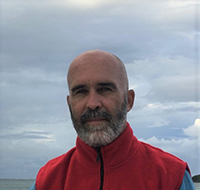 Dr. Gérald Darnis is a postdoctoral fellow with Dr. Maxime Geoffroy in CFER. His research interests include marine biodiversity, trophodynamics of marine ecosystems, function of zooplankton in the biogeochemical cycling of elements such as carbon and nitrogen, and Arctic zooplankton biogeography and community structure. His current research focuses on ecological connectivity within the North American Arctic and the role of zooplankton feeding and migration on carbon export from the ocean surface layer.
Dr. Gérald Darnis is a postdoctoral fellow with Dr. Maxime Geoffroy in CFER. His research interests include marine biodiversity, trophodynamics of marine ecosystems, function of zooplankton in the biogeochemical cycling of elements such as carbon and nitrogen, and Arctic zooplankton biogeography and community structure. His current research focuses on ecological connectivity within the North American Arctic and the role of zooplankton feeding and migration on carbon export from the ocean surface layer.
Prior to joining the CFER team, Gérald was a postdoctoral researcher at Université Laval where he coordinated the Kitikmeot Marine Ecosystems Study under the supervision of Dr. Louis Fortier. He did a postdoc at Akvaplan-Niva in Norway where his research focused on zooplankton vertical migration and the importance of this process for the biogeochemical flux of carbon, mainly through active transport to the deep ocean. He obtained a PhD in oceanography and a MSc in biology from Université Laval, and a Bachelor of Science from Université du Québec à Montréal (UQAM).
Muriel Dunn, PhD candidate, Fisheries Science
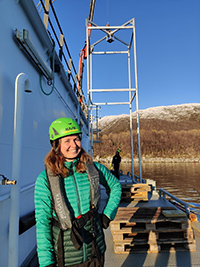 Muriel Dunn is a PhD student with CFER supervised by Dr. Maxime Geoffroy and Dr. Geir Pedersen (Institute of Marine Research, Norway). She completed her undergraduate studies in physics and oceanography at the University of British Columbia in Vancouver, British Columbia.
Muriel Dunn is a PhD student with CFER supervised by Dr. Maxime Geoffroy and Dr. Geir Pedersen (Institute of Marine Research, Norway). She completed her undergraduate studies in physics and oceanography at the University of British Columbia in Vancouver, British Columbia.
After completing her bachelor's degree, she worked as a at-sea fisheries observer for groundfish fisheries on the west coast of Canada and at RBR Ltd. developing data analysis tool for oceanographic instruments.
Muriel completed her master's degree in physical oceanography with a focus on ocean acoustics at Memorial University of Newfoundland and Labrador. Her doctoral thesis is on remote sensing of underwater organisms using active acoustics.
She is working on methods for competing hydroacoustic surveys from autonomous ocean-going vehicles. Her PhD is part of Glider II and Bioglider projects in collaboration with Akvaplan-niva, in Tromsø, Norway.
Jennifer Herbig, PhD candidate, Fisheries Science and Technology
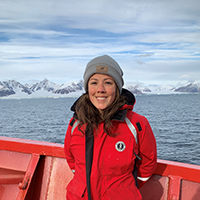 Jennifer Herbig (she/her) has a BSc in marine biology from the University of North Carolina, Wilmington and an MSc in fisheries from Auburn University. Prior to starting her PhD, she worked as a biologist for the State of Mississippi and the State of Florida assessing the effects of artificial habitat and MPAs on important fisheries species.
Jennifer Herbig (she/her) has a BSc in marine biology from the University of North Carolina, Wilmington and an MSc in fisheries from Auburn University. Prior to starting her PhD, she worked as a biologist for the State of Mississippi and the State of Florida assessing the effects of artificial habitat and MPAs on important fisheries species.
Currently, she is a PhD candidate in the Fisheries Science and Technology program at the Marine Institute of Memorial University of Newfoundland in the Center for Fisheries Ecosystems Research (CFER) under the supervision of Dr. Maxime Geoffroy and Dr. Jonathan Fisher.
Her research focuses on the effects of environmental variation and bottom-up processes on the abundance, distribution, and movement of Arctic Cod (Boreogadus saida) in the Canadian Arctic.
Eugenie Jacobsen, PhD candidate, Fisheries Science and Technology
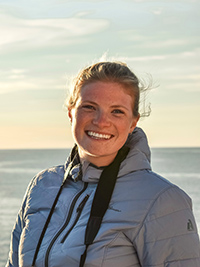 Eugenie Jacobsen (she/her) is a PhD student who studies contaminants (mercury and organochloride pesticides) in demersal and pelagic fish from the Labrador Sea and the Canadian Arctic.
Eugenie Jacobsen (she/her) is a PhD student who studies contaminants (mercury and organochloride pesticides) in demersal and pelagic fish from the Labrador Sea and the Canadian Arctic.
One of her study fish includes myctophids (or lantern fish) which are one the most abundant pelagic fish found worldwide yet their ecology remains poorly studied. Alongside her passion for contributing to innovative research, Eugenie is also passionate about science communication and its role in inspiring the public to become stewards for our natural world.
Léa Joly, Postdoctoral Fellow
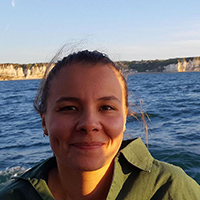 A big welcome to new CFER post-doc, Léa Joly!
A big welcome to new CFER post-doc, Léa Joly!
Léa is a marine biologist specialized in the ecology and physiology of marine organisms, with a particular interest for fish and fish larvae.
She is working as a postdoc in Germany (Geomar/FTZ-Kiel University) on the impact of climate change on a benthic ecosystem and is currently working at MI with Maxime Geoffroy's team, on a Visiting Fellowship from OFI to assess the biodiversity of Arctic glacial troughs.
Ashley Oates, MSc, Fisheries Science and Technology
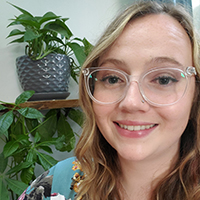 Originally from Harbour Grace, Newfoundland, Ashley Oates is an MSc student in fisheries science working under the supervision of Dr. Maxime Geoffroy. Ashley received her bachelor’s degree from Dalhousie Agricultural campus with a major in animal science and minor in aquaculture. Since graduating in 2018, Ashley has worked at three different Aquaculture companies located in PEI: AquaBounty, Halibut PEI and Ocean Trout Inc.
Originally from Harbour Grace, Newfoundland, Ashley Oates is an MSc student in fisheries science working under the supervision of Dr. Maxime Geoffroy. Ashley received her bachelor’s degree from Dalhousie Agricultural campus with a major in animal science and minor in aquaculture. Since graduating in 2018, Ashley has worked at three different Aquaculture companies located in PEI: AquaBounty, Halibut PEI and Ocean Trout Inc.
Ashley’s research focuses on northern and striped shrimp in the high Canadian Arctic with the estimation if shrimp fisheries could extend northward.
Gabrielle Perugini, MSc, Fisheries Science and Technology
 Gabrielle Perugini is entering her first year as a Fisheries Science and Technology Masters student.
Gabrielle Perugini is entering her first year as a Fisheries Science and Technology Masters student.
Gabrielle earned her Bachelor of Science, Honours, in Marine and Freshwater Biology at the University of Guelph. She successfully completed an undergraduate thesis in fish toxicology, specifically, the effects of diluted bitumen on early life stages of Coho salmon (Oncorhynchus kisutch). For four years she worked at the Great Lakes Laboratory for Fisheries and Aquatic Sciences (GLLFAS) as a Summer Research Technician and Aquatic Science Technician. Here she developed many skills in fish collection, processing, acoustic telemetry, water sampling, electrofishing and freshwater fisheries science. Her interests align with fisheries, larval fish, ecology, and marine biology.
For her thesis she will be working with Fisheries and Oceans Canada to investigate top-down (predation) drivers of larval capelin survival in the North Atlantic. She will be co-supervised by Dr. Maxime Geoffroy (CFER) and Dr. Hannah Murphy (DFO).
Einat Sandbank, PhD candidate, Fisheries Science
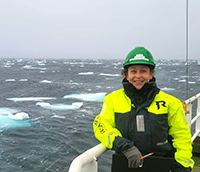 Einat Sandbank (She/Her) is a PhD student with CFER working under the supervision of Dr. Maxime Geoffroy and Dr. Malin Daase (UiT, The Arctic University of Norway). Einat received her undergraduate degree in aquatic and fisheries science from SUNY College of Environmental Science and Forestry and a master’s degree in ecosystem management from the University of Miami RSMAS.
Einat Sandbank (She/Her) is a PhD student with CFER working under the supervision of Dr. Maxime Geoffroy and Dr. Malin Daase (UiT, The Arctic University of Norway). Einat received her undergraduate degree in aquatic and fisheries science from SUNY College of Environmental Science and Forestry and a master’s degree in ecosystem management from the University of Miami RSMAS.
Prior to pursuing her PhD, Einat worked in benthic ecology research and restoration in the Florida Keys as well as in Massachusetts. Her PhD research focuses on the spatio-temporal patterns of the diet and distribution of pelagic fish and zooplankton across the Barents Sea polar front.

